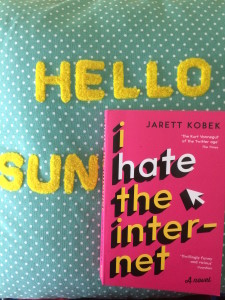 Der Roman der Stunde
Der Roman der Stunde
Jarett Kobek hat I hate the internet im Selbstverlag bei Amazon eingestellt – und etwas geschafft, das von diesen Selbstverlagautoren so gut wie keiner schafft: Sein Buch wurde von einem Verlag aufgegriffen und publiziert, in diverse Sprachen übersetzt, ein Superseller. Dass dieser Roman im Internet seinen Anfang nimmt, das passt, denn das Internet hat er auch zum Inhalt. Nichts als das Internet. Um es einmal klar zu sagen: Dies ist ein wirklich schlechtes Buch. Eigentlich. Das betont der Autor selbst auch immer wieder, er macht daraus kein Geheimnis. Vielmehr spielt er damit, stellt sich selbst dadurch einen Freibrief aus. Dies ist ein mieser Roman, schreibt er, und deswegen kann er darin tun, was er will. I hate the internet ist ein wahnsinnig sarkastisches, fieses, böses, lustiges, grausiges Buch mit vielen Gedanken, die wir alle wohl schon hatten, und ohne Handlung. Ich hab gelacht mit diesem Roman, ich hab genickt, mich gegruselt, mich abgeholt gefühlt – und dass er schlecht ist, war mir vollkommen egal.
Irgendwie, am Rande, geht es um eine Frauenfigur namens Adeline, Comiczeichnerin und Internet-Unwissende, die einen Vortrag hält und dabei Meinungen äußert, die ihr einen gepflegten Shitstorm einbringen. Der Autor bleibt aber nicht bei seiner Figur, sondern mäandert ziellos herum, kommt von einem zum anderen, springt, spottet und witzelt – stets mit ernstem Hintergrund. Sein Buch zu lesen, ist, als würde man im Internet surfen: Man klickt sich durch, kommt von einem Wikipedia-Eintrag zu einem anderen zu einem Youtube-Video zu einer Band-Website zu Facebook und dann hat man längst vergessen, was man ursprünglich gesucht hat.
I hate the internet löst ein Lachen aus, das einem im Hals stecken bleibt. Silicon Valley, Hipster, Google, Gentrifizierung, Rants und Grids und Likes, geistiges Eigentum und dessen Diebstahl, Geld, Banken, Lug und Trug, Hatespeech: Das ist unsere Welt. Jarett Kobek analysiert sie nicht, er bildet sie ab, und das ist wahrlich schlimm, denn: Alles, was er schreibt, ist wahr. Und damit ihr euch besser vorstellen könnt, wie sich I hate the internet liest, soll das Buch hier selbst zu Wort kommen:
The internet was a wonderful invention. It was a computer network which people used to remind other people that they were awful pieces of shit.
Some of her other mistakes: She was a woman in a culture that hated women. She’d become kind of famous. She’s expressed unpopular opinions.
The One True God was an idea that took many forms and shapes. The One True God was a potent weapon used by sexually repressed members of society to inflict misery on everyone else.
Automobiles were mechanized vehicles which transported human beings from one point to another while destroying the atmosphere and the planet.
The formalized systems in which grown men threw around balls were called sports. Sports were big money for men who threw around balls, and even bigger money for the men who paid other men to throw around balls. Typically the men who paid other men to throw around balls would find their employees among the poor and ill-educated, as the poor and ill-educated were more likely to sign bad contracts.
It was the twenty-first century. It was the internet. Fame was everything. There was nothing left to buy. Fame was everything because traditional money had failed. Fame was everything because fame was the world’s last valid currency.
Adeline’s real error was critizising both Beyoncé and Rihanna and their fans’ relationship to their achievements. Beyoncé and Rihanna were pop stars. Pop stars were musical performers whose celebrity had exploded tot he point where they could be identified by single words. You could say BEYONCÉ or RIHANNA to almost anyone anywhere in the industrialized world and it would conjure a vague neurological image of either Beyoncé or Rihanna. Their songs were about the same six subjects of all songs by all pop stars: love, celebrity, fucking, heatbreak, money and buying ugly shit.
All the while, Google was making money.
Sometimes it feels like there are only eleven people in the world and that the rest are paste.
Weirdly, anywhere in America, gay people could marry other gay people of the opposite gender. This tended to defeat the purpose of marriage, a social tradition by which sex is legitimized through shared bank accounts.
The illusion of the internet was the idea that the opinion of powerless people, freely offered, had some impact on the world. This was, of course, total bullshit and a crzy idea of who ran the world. The world was not run by its governments. The world was not run by its celebrities. The world was run by its bankers. The history of human destiny was money, the men who controlled it, and nothing more.
I hate the internet von Jarett Kobek ist auf Deutsch unter dem Titel Ich hasse dieses Internet bei S. Fischer erschienen.
Guten Morgen,
Das hört sich super interessant an und scheint ein Buch zu sein, dass man so noch nie gelesen hat. Werde es auf jeden Fall auf meine Wunschliste setzen.
Danke für den Buchtipp.
Wünsche dir eine tolle Woche!
Das ist es wirklich, da hast du Recht! Bin gespannt, ob du es mal lesen wirst und wie du es findest. Dir auch eine schöne Woche 🙂
Pingback: Olivia Sudjic: Sympathie | Bücherwurmloch
Pingback: Olivia Sudjic: Sympathie – We read Indie
Habs jetzt auch gelesen – und kann dir nur zustimmen. Obwohl und erst recht weil ich so lange Teil der Welt war und immer noch so viele Berührungspunkte damit habe. Das Buch braucht keine Handlung, um gut zu sein. Auf äußerst böse Weise …
Und dabei ist es eigentlich echt schlecht 😅